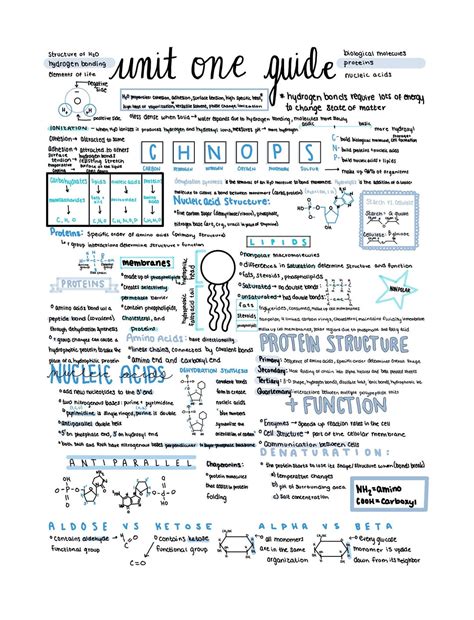Introduction

Preparing for the AP Biology exam requires a comprehensive understanding of the fundamental concepts covered in Unit 1. Quizlet, an online learning platform, offers a valuable tool for students to reinforce their knowledge and enhance their test-taking skills.
Biology: The Study of Life
- Define biology: The scientific study of living organisms and their interactions with each other and the environment.
- Characteristics of living organisms: Reproduction, growth and development, response to stimuli, regulation, homeostasis, and adaptation.
- Levels of biological organization: Atoms, molecules, cells, tissues, organs, organ systems, and organisms.
Chemical Basis of Life
- Elements essential for life: Carbon, hydrogen, oxygen, nitrogen, phosphorus, and sulfur.
- Organic molecules: Carbohydrates, lipids, proteins, and nucleic acids.
- Water: Essential for life, comprising around 60-70% of human body weight.
Cells: The Basic Units of Life
- Cell theory: All organisms are composed of one or more cells.
- Types of cells: Prokaryotic and eukaryotic; prokaryotes lack a nucleus, while eukaryotes have a nucleus and other membrane-bound organelles.
- Cell organelles: Nucleus, ribosomes, mitochondria, endoplasmic reticulum, Golgi apparatus, and lysosomes.
Cell Membranes
- Structure of a cell membrane: Phospholipid bilayer with embedded proteins.
- Functions of a cell membrane: Regulates the movement of molecules into and out of the cell.
- Diffusion and osmosis: Passive transport processes where molecules move across the membrane.
Bioenergetics
- Thermodynamics: Laws governing energy transfer.
- ATP (adenosine triphosphate): Universal energy currency of cells.
- Cellular respiration: Process by which cells break down glucose to produce ATP.
- Photosynthesis: Process by which plants use sunlight to synthesize glucose.
Enzymes
- Definition of an enzyme: Protein that catalyzes chemical reactions.
- Characteristics of enzymes: Highly specific, increase reaction rates, and are not consumed during the reaction.
- Factors affecting enzyme activity: Temperature, pH, and presence of inhibitors and activators.
Quizlet Features and Strategies
- Flashcard builder: Create digital flashcards with questions and answers.
- Spaced repetition: Selectively reviews flashcards based on difficulty and time since last review.
- Quiz modes: Test your knowledge through multiple-choice quizzes, matching games, and written answers.
- Study groups: Join or create study groups to collaborate with peers.
Effective Strategies for Success
- Use Quizlet regularly: Review the material daily or weekly to reinforce learning.
- Active recall: Test yourself by answering questions without looking at the answers.
- Regular breaks: Take short breaks during study sessions to improve focus and retention.
- Variety of study methods: Use different Quizlet modes and activities to engage multiple senses.
- Feedback and assessment: Track your progress and identify areas for improvement by taking practice tests and reviewing your results.
Frequently Asked Questions (FAQs)
-
Is Quizlet effective for AP Biology Unit 1 preparation?
Yes, Quizlet can effectively reinforce understanding of the foundational concepts covered in Unit 1. -
How many flashcard sets should I create?
The number of sets depends on the amount of material you need to cover. Consider creating separate sets for different topics or chapters. -
How often should I review my flashcards?
Review flashcards daily or several times a week, especially during the weeks leading up to the exam. -
Can Quizlet help me with the AP Biology free-response questions?
While Quizlet primarily focuses on multiple-choice questions, it can also be used to practice writing concise and accurate answers. -
How can I collaborate with others using Quizlet?
Join or create study groups to share flashcards, quiz each other, and discuss concepts. -
What additional resources can I use to supplement my Quizlet preparation?
Textbooks, online videos, and practice exams can provide complementary support for AP Biology Unit 1.
